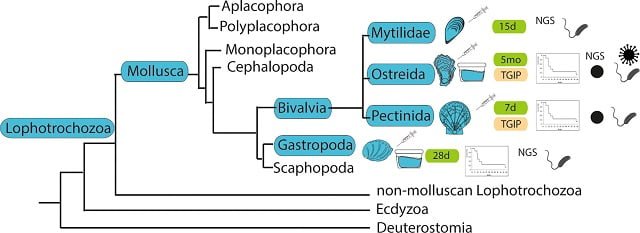
Marine mollusks, such as oysters, mussels, and clams, are a vital part of aquaculture, providing us with delicious and nutritious seafood. However, these creatures face a growing threat: infectious diseases. Traditional solutions, such as antibiotics, are limited, and genetic modification may have drawbacks.
A team of scientists from the Université de Montpellier (France), Ifremer (France), Institute of Marine Research (Spain), and Université Bretagne Sud (France) published a scientific review bringing together the latest advances in trained immunity capabilities found in economically important marine mollusks and proposing a framework for future research to assess the feasibility of implementing trained immunity for disease control in mollusk aquaculture.
The challenge: keeping mollusks healthy
Aquaculture is booming, but diseases threaten mollusk populations. Current methods for disease control have limitations:
- Antibiotics: Difficult to use in open sea farms and may promote antibiotic resistance.
- Probiotics: Promising in laboratory settings, but effects may be inconsistent.
- Biosecurity: Effective in hatcheries but not for open sea cultivation.
- Genetic selection: Can reduce genetic diversity and make mollusks vulnerable to future diseases.
What is trained immunity?
These limitations demand innovative solutions to ensure sustainable aquaculture. This is where trained immunity comes into play.
Unlike the adaptive immune system of vertebrates (think antibodies and memory cells), mollusks rely on their innate immune system. Trained immunity is a remarkable capability of this innate system to “learn” from past encounters with pathogens.
Mollusks lack an adaptive immune system that “remembers” past infections. However, recent research suggests a hidden power within their innate immune system: trained immunity.
In this sense, trained immunity involves stimulating a mollusk’s innate immune system to “remember” past encounters with pathogens, leading to a stronger response to future exposure.
How does trained immunity work in mollusks?
Mollusks possess a powerful innate immune system, their first line of defense. Here’s how trained immunity might work:
- Immune memory: Upon encountering a pathogen, the immune system “remembers” the threat.
- Enhanced response: When the mollusk faces the same pathogen again, the immune response is quicker and stronger.
- Broader protection: Trained immunity could even offer protection against related pathogens.
Benefits of trained immunity for mollusk aquaculture
- Enhanced disease resistance: Trained immunity can generate a stronger immune response upon reinfection, reducing disease outbreaks.
- Sustainable approach: This method does not involve antibiotics or genetic modification, making it more environmentally friendly.
- Broader protection: Trained immunity can provide protection even against unrelated pathogens.
- Better animal welfare: Healthier mollusks contribute to overall better animal welfare.
The science behind mollusk trained immunity
Studies suggest that exposure to microorganisms or their components can “train” mollusk immune systems. This training may involve:
- Increased phagocytosis: Immune cells become more efficient at engulfing and destroying pathogens.
- Enhanced hemocyte populations: The number of immune cells increases, improving overall defense.
- Intensified oxidative stress response: The immune system produces more reactive oxygen species to combat invaders.
- Changes in gene expression: Genes involved in immunity become more active, enhancing the overall defense response.
The future: harnessing trained immunity in aquaculture
This research review paves the way for exploring trained immunity in mollusk aquaculture. This is what scientists will focus on:
- Mechanism understanding: Further research is needed to understand how trained immunity works in mollusks fully.
- Development strategies: Scientists will explore ways to stimulate trained immunity in mollusks to enhance their natural defenses.
- Solution implementation: Practical methods will be developed to incorporate trained immunity into aquaculture practices.
Conclusion
By harnessing the power of trained immunity, we can create a more sustainable future for mollusk aquaculture, ensuring healthy populations of seafood for generations to come.
The study was funded by ‘Primoyster’ sponsored by the French Research Agency.
Contact
Caroline Montagnani
UMR 5244 IHPE, CC80, Université de Montpellier- 2
place Eugène Bataillon, 34095 Montpellier, France.
Email: cmontagn@ifremer.fr
Reference (open access)
Montagnani, C., Morga, B., Novoa, B., Gourbal, B., Saco, A., Rey-Campos, M., Bourhis, M., Riera, F., Vignal, E., Corporeau, C., Charrière, G. M., Travers, A., Dégremont, L., Gueguen, Y., Cosseau, C., & Figueras, A. 2024. Trained immunity: Perspectives for disease control strategy in marine mollusc aquaculture. Reviews in Aquaculture. https://doi.org/10.1111/raq.12906
Editor at the digital magazine AquaHoy. He holds a degree in Aquaculture Biology from the National University of Santa (UNS) and a Master’s degree in Science and Innovation Management from the Polytechnic University of Valencia, with postgraduate diplomas in Business Innovation and Innovation Management. He possesses extensive experience in the aquaculture and fisheries sector, having led the Fisheries Innovation Unit of the National Program for Innovation in Fisheries and Aquaculture (PNIPA). He has served as a senior consultant in technology watch, an innovation project formulator and advisor, and a lecturer at UNS. He is a member of the Peruvian College of Biologists and was recognized by the World Aquaculture Society (WAS) in 2016 for his contribution to aquaculture.
